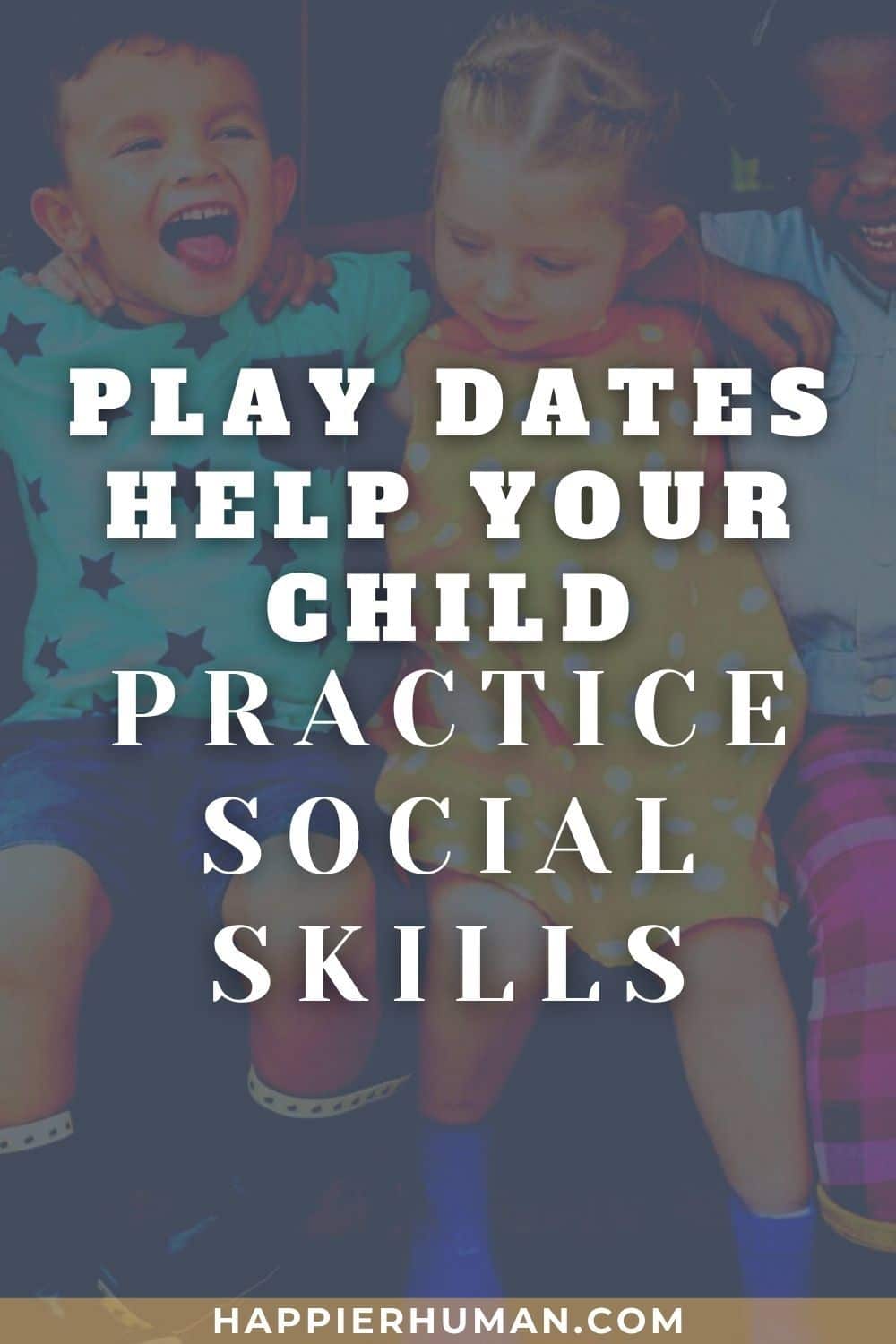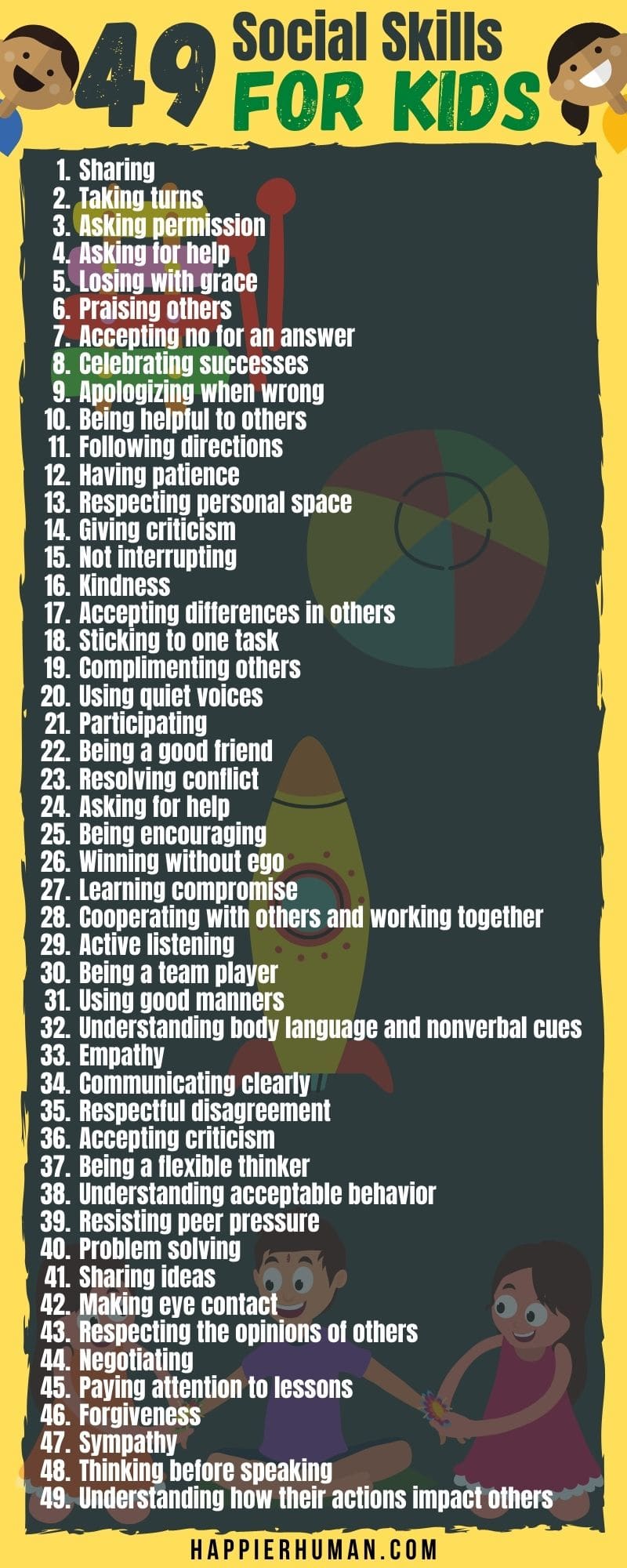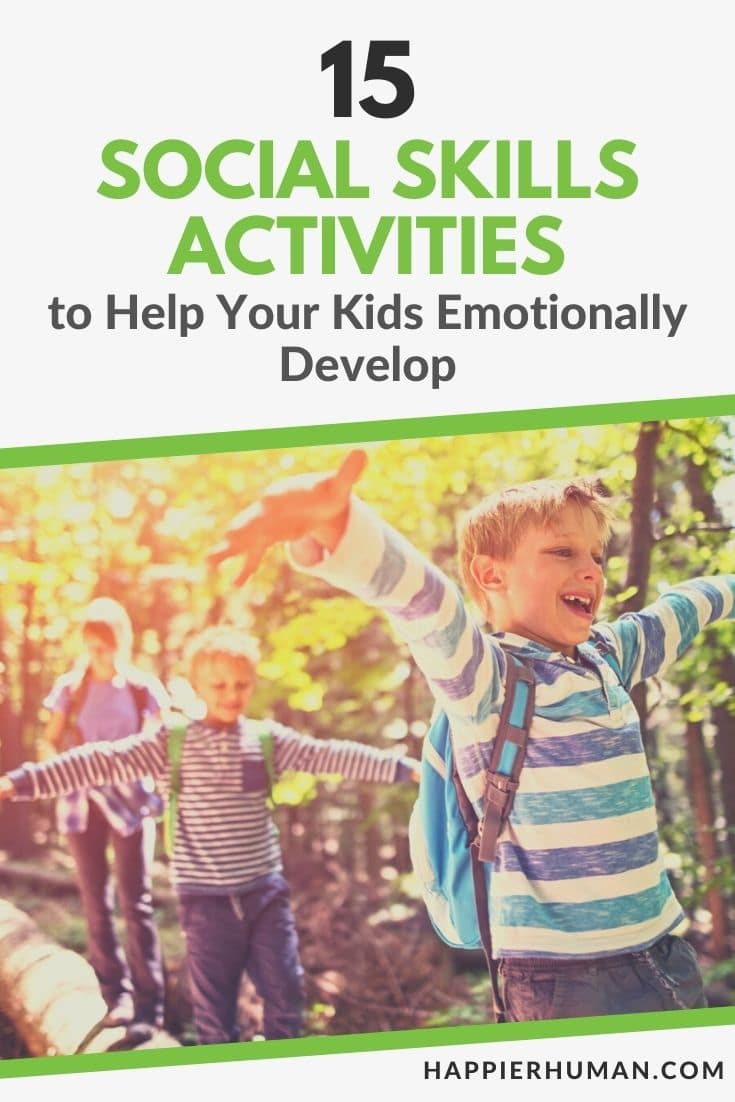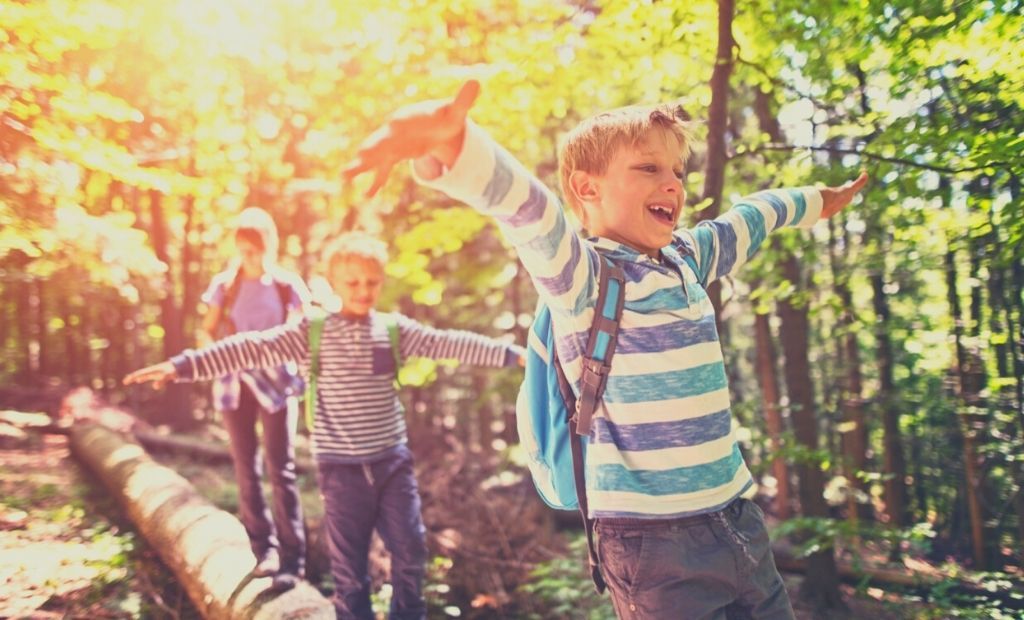There might be affiliate links on this page, which means we get a small commission of anything you buy. As an Amazon Associate we earn from qualifying purchases. Please do your own research before making any online purchase.
When you think of children with good social skills, what comes to mind?
A child with lots of friends? A child who is comfortable in many different settings or a child who plays well with others?
Although these things come naturally for some kids, for others this is not the case. The good news is you can use social skills activities to help your child improve in these areas.
In this article we’ll identify 15 social skills activities to help your kids emotionally develop. Don’t worry. These activities are not complicated or time consuming. In fact, most social skills activities are regular everyday activities with an emphasis on developing social awareness, empathy and cooperation. So, let’s get to it.
But first, let’s start with a quick definition.
What You Will Learn
What Are Social Skills Activities?
Social skills activities are deliberate activities your child can participate in which will help them better interact with others.
So, why are social skills so important anyway? According to psychotherapist Amy Morin LCSW, “Good social skills allow kids to enjoy better peer relationships. But the benefits of robust social skills reach far beyond social acceptance. Children with better social skills are likely to reap immediate benefits.”
Some of these benefits include less stress and better friendships. One study published in the American Journal of Public Health even hails strong social skills in kindergarten as a key factor in life long career success.
With increasing stress over unemployment, cultural differences and forced lifestyle changes, it’s imperative that parents do their part to make sure children have the social skills and coping skills needed to live in our “new normal.”
So let’s talk about the various activities you can use to help your children grow.
15 Social Skills Activities to Help Your Kids Emotionally Develop
1. Team Sports
Team sports are revered as one of the best ways to help kids foster a sense of community, perseverance and friendships. Even most doctors recommend getting your kids involved in team sports to build social skills and get needed exercise.
Dr. Randy Goldstein, a Kansas City pediatrician specializing in sports medicine, recommends team sports because it gives kids a chance to, “work together toward a common goal.” He also claims another important aspect of team sports is the opportunity the child has to take instruction from someone other than their parent. “This is important to learning how to be around future teachers, future bosses and future leaders.”
Team sports should be approached with care and attention to the individual child’s abilities and personality. Team sports which are overly competitive or stressful should be avoided. Talk with parents on teams you are considering to get a feeling for the competition level and time commitments.
2. Camps and Retreats
Children who don’t get opportunities to practice social skills will often have a deficiency in this area. It’s important for parents to get comfortable allowing their child to branch out and spend time away from home.
Camps and retreats are a great way to do this. Camps or retreats give kids the opportunity to see themselves outside of the family unit which is an important part of normal social development. Many camps and retreats also purposefully organize social skill building activities into their schedules which further helps in this area.
3. Religious Involvement
Although not everyone will subscribe to an organized form of religion, for those who are comfortable with this option, religious involvement offers a great opportunity for social skills building. Most religious involvement is by nature community oriented. This gives your children the opportunity to interact with others on a weekly basis. Participation in religious activities and groups can help your child develop a sense of belonging and security.
4. Pet Ownership
You might think that owning and caring for an animal would have little to do with your social skills towards other humans, but pets are a great way to help your child practice proper interaction and empathy.

Animals offer a safe opportunity for children to learn responsibility toward another living thing as well as gentleness and empathy in a setting free from potential judgment. The double-sided sword of encouraging your child’s social skills is that sometimes people are not so nice. When your child has a negative experience with someone it can really derail their social development.
Pets are a great way for children to build trust, offer care and empathy and in turn receive the rewards of that: returned affection and companionship.
5. Turn Taking
In our society most children are privileged to have plenty of everything, including toys and technology. If everyone has the latest toy or coolest game, there is little opportunity to for turn taking. It is up to the parents to make a conscious effort to look for opportunities for turn taking.
This could mean not buying every child in the house every toy. Having a few toys or devices designated for “sharing” is a great way to cultivate your child’s understanding of delayed gratification as well as the important social skill of putting others first and waiting your turn.
Another way parents can foster turn taking is to not rescue their child from waiting a turn. Often if a child becomes distressed over waiting for a turn, the parent will encourage the child to play with a different toy or move on to a different activity rather than allowing the child the experience of waiting for their turn. Distracting the child to another activity does not help achieve social or emotional development. Encourage turn taking and waiting.
6. Spending Time with Varied Age Groups
Historically, children would have grown up surrounded by people from a variety of ages. Older children were often expected to help care for younger siblings, and older relatives often lived in multi-generational homes. This was good for social development. Today, children are often segregated into age groups at school which then bleeds over into their friend groups.
Encouraging your children to spend time with varied age groups can help them better relate to people. Older people have much to teach younger children. Also, kids can begin to cultivate a sense of leadership and responsibility when they are given the opportunity to spend time with friends or relatives younger than themselves.
7. Board Games
Although many people might think that board games are just a form of entertainment, for children board games can be a rich opportunity for social skills development. Board games require many of the skills which are hailed as important for social interaction. Turn taking, cooperation, honesty and team work to name a few.
The added benefit of board games is that it gives families an opportunity to spend quality time together.
8. Play Dates
If your child does not have an established friend group, then organizing play dates is a great way to give them a chance to work on social skills. Play dates will help your child meet new people and hopefully foster new friendships.

Susan Diamond, the author of the popular book, “Social Rules for Kids,” encourages parents to use play dates as a way to, “introduce your child to the concept of using rules when a friend comes over and to teach him how to be polite to guests.” Diamond also believes that play dates are a safer way for kids to practice social skills they are working on. In a small one on one setting there is less chance of bullying or judgments.
9. Community Involvement
When parents think of their child’s social skill development, they are often thinking in terms of how their child interacts with other children. Social skills development, however, goes much farther than that. One crucial aspect of social skills development is helping our children understand their place in their society.
Children often operate in a small bubble of their family, their school and their friend group. As is often the case, children do not have the opportunity to see how people from other walks of life live.
Getting your child involved in their community will give them the chance to meet people from different backgrounds and to begin to understand how families can differ. This is an important concept in order to avoid social downfalls such as entitlement and prejudice against people who are different.
10. Volunteering
One of the best ways to help your child increase their community involvement is through volunteering. Volunteer work will bring you and your children into contact with a variety of people from different cultures and backgrounds.
The more variety of people your child has the chance to interact with, the more opportunities your child will have to develop social skills and to understand their place in the social world. Volunteering is also one of the best ways to make yourself happier as well as spread that happiness to others.
11. Chores
Though not usually considered a social skills development activity, chores are actually an important tool for social development. Remember, social skills are not limited to making friends or being a good friend, although that is important. Social skills involve the entire spectrum of your child finding their place in society.
One important reality of living in society is an understanding that you must do your part. You must fulfil your responsibilities. Chores within the home help prepare the child for working within society later on.
12. Role Playing Games
Role playing games are another great way to help your child navigate social situations in a safe way. Spend time with your child playing, “What Would You Do?” games. These games can be used to cover every day social interactions, “What would you do if someone breaks in line in front of you?” or more serious issues, “What would you do if you saw a friend getting bullied?”
Act out these situations with your child to help them think about socially appropriate ways to handle these events.
13. Talking
Never underestimate the power of just having conversations with your kids. Kids learn most of their social skills by interacting with their family first. Make time for talking during family dinners, before bedtime, whenever. Any time is a good time to talk to your kids.

14. Limited Involvement Parenting
We are all familiar with the term “helicopter parenting” or “over parenting.” However, you may not be familiar with how this parenting style affects your child’s social development.
In their book, “The Overparenting Epidemic,” psychiatrist George Glass and parenting specialist David Tabatsky describe over parenting. “Over parenting occurs when someone tries too hard to manage the outcome of his or her child’s life, imposing his or her own expectations, often inappropriately regardless of the child’s wishes or abilities.”
When parents take on too much responsibility for their child’s life, the child will be left to feel as if they themselves are not an active part in their own lives. They simply exist to take cues from their parents. This can be devastating in the social arena. Confidence grows when a child is left to experience some trial and error for themselves, consequences and all. Limited involvement parenting can be a very powerful way to allow your child to experience their social world and grow their confidence.
15. Child Led Resolutions
One of the best ways to help your child develop their social skills is to give them the chance to settle their own problems with other kids. Do not run to their rescue all the time. If your child is not in physical danger, let them handle the problem. Problem resolution is a huge part of social development and it is a skill they will literally use their entire life. Give them the chance to develop it.
Final Thoughts on Social Skills Activities
Social skills development is crucial to your child’s happiness each day as well as their long-term success as adults. You can use these easy activities, as well as others, to help develop and strengthen these skills.
The best way to develop social skills is always to find teachable moments each day to show your children how they can be more helpful, cooperative and compassionate.


